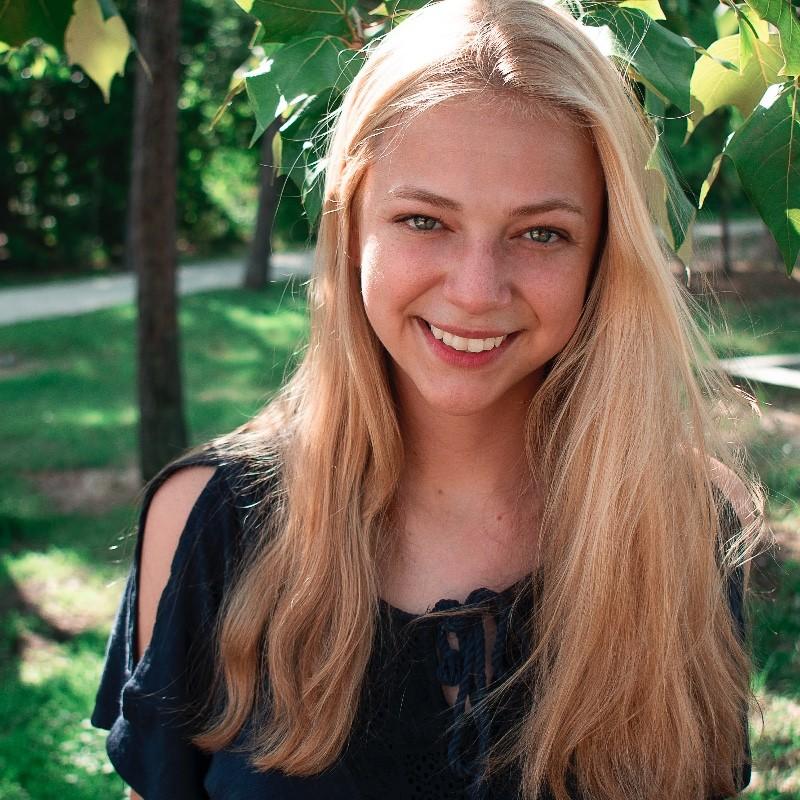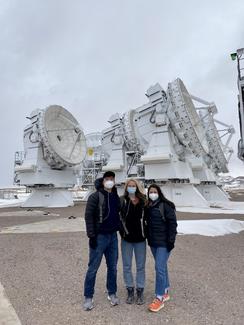Paige Cromley ’24 reflects on her intergalactic internship in Chile

Because of its dry, clear skies and remoteness, Chile’s vast Atacama Desert is home to many astronomical observatories, including the world-class Atacama Large Millimeter/Submillimeter Array (ALMA for short, meaning “soul” in Spanish). I’m an astrophysics major who grew up seeing photos produced by ALMA, and I’ve always wanted to visit the observatory myself for the chance to peek at the massive antennas pointing toward starry skies.
This summer, I fulfilled that dream — and more. A science communications internship through the International Internship Program (IIP) with the ALMA observatory gave me the opportunity to live in Santiago for two months while working on a project with ALMA’s education and public outreach team.
While a lot of research done through ALMA has made international headlines, I wanted to bring the story of the observatory to a wider audience. I created a podcast, focusing on the operations, people and technology behind the observatory. The show, titled “ALMA’s Little Universe,” is a series of mini-episodes, about three minutes each, that covers a range of topics, from the type of data collected by the observatory radio antennas to the hospitality staff on site.

I was given a lot of freedom in creating this project. Conversations with ALMA staff helped me pick topics for each episode: I talked to people from all over the world representing a variety of roles at the international observatory, from its Canadian director to Taiwanese astronomers to Chilean engineers who specialize in cryogenics.
Mostly, I worked in the Santiago office, but for a few days in early July, I had the chance to visit the actual observatory site in the north of Chile. I stayed in a science-fiction-esque residential compound where engineers and workers live for about a week at a time while they’re “on shift” and got to glimpse the Milky Way for the first time in the dry desert sky. Some constellations only exist in the Southern Hemisphere; while star-gazing in the Atacama Desert, I could see the Southern Cross. The seasons were also different there; I spent my summer vacation wrapped in sweaters during a Chilean winter. While hiking through knee-deep snow on a mountain next to Cerro Provincia, I realized my mom had been right: I should have packed more warm clothes.
The most tangible difference, of course, wasn’t the weather or the constellations, but the language. I arrived in Santiago not knowing a word of Spanish, and though my work was in English, adjusting to life in a Spanish-speaking city was challenging. Routine elements of life, like ordering a coffee or asking for directions, now required online dictionaries and a lot of handwaving. Colleagues often carried out meetings or conversations in their native tongue as I desperately tried to pick out words I had learned on Duolingo. But it was a growing experience, and now I’m enrolled in an introductory Spanish course at Princeton. Hopefully, I’ll return one day fluent.
By working in science communications, I was able to explore two of the fields I’m most interested in, astronomy and journalism. I hope one day to work in a career at the intersection of science and storytelling, and this internship both affirmed that dream and gave me practical experience toward it. It was also incredibly helpful to be immersed in a workplace like ALMA for two months; the diversity of jobs and people who work there, as well as the general supportive environment and the passion of the staff taught me a lot about what kind of workplace I’d like to seek in the future.
I also made a deliberate effort with my roommates to explore the culinary scene of Santiago. Friends recommended dishes to us, and I quickly became obsessed with manjar, also known as dulce de leche, which can be found in an impressive number of desserts. We were most eager to attend an asado, kind of like an Argentinian barbecue, where meat is char-grilled on a parrilla. One of our last weekends was spent at the home of two fellow interns. The food was delicious, of course, but I was most grateful for having been welcomed by our new friends and for the time spent chatting together.
Overall, this was a theme of my experience living abroad: The best memories I have are the moments when new friends took the time to share something with me, whether it was food, a hiking path they love, a Spanish phrase or simply time.
